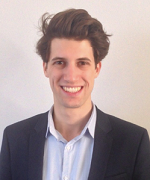by Alexander Pichler.
From February to March 2018 I was doing a two-months clerkship at the Department of Radiology in the hospital Vivantes Klinik am Urban. This hospital is a part of the Vivantes Hospital Group and a teaching hospital of the Charité Universitätsmedizin Berlin.
I chose Berlin to become acquainted with working conditions and training in Germany. As Germany is ten times bigger than Austria, there are more options and opportunities for doctors. There is a broader choice in terms of academic environment, which is very important. I think that for becoming a clinician in the future it is very helpful to have a better understanding of radiology. Also, it is helpful to get the time and opportunity to look deeper into the wide diagnostic field radiology offers.


Application process
The application was proceeded by the Vivantes Hospital Group itself and not by Charité. It simplified the application process for international students, because every application is handled equally. At Charité, German students had priority in the selection process. So, I just wrote an email to the secretary office of the Department of Radiology. The rest of the application process after receiving the confirmation was very well organized and there were no complications.
In the clinic
The daily business in the clinic was interpreting chest x-rays, CTs of abdomen, thorax and head or different MRTs. The topics were wide spread, everything that internal medicine and trauma surgery could offer.
An interesting fact is that the clinic is located in the south of Berlin in the district of Kreuzberg nearby the district of Neukölln. Berlin is generally considered to be a safe city, although its population is about 6 million. Especially due to the closeness of the hospital to Neukölln, a district in former times notorious for a higher crime rate than other areas and German cities, a broad spectrum of patients suffering from violent attacks like knife attacks or gunshots can be seen at the department of Radiology occasionally. They are usually transferred by ambulance and normally a CT scan is necessary to assess the extent of their injury.
On my arrival, I was given access to the computer system of the clinic and was able to work with all the resources other doctors were using. Morning meetings usually started at 8 a.m. Sometimes, for presenting special cases, video conferences with other hospitals in Berlin were organized.
The Department of Radiology provided daily lunches at the canteen for students for free, so I visited it regularly. Usually I left the department at around 4 p.m., but working times were very flexible. Joining night shifts was also offered.
Teaching
All radiologists motivated me to diagnose some X–rays and CTs of new patients and to have a first look. I started with interpreting X-rays and, when I felt confident enough, I also interpreted some CT of abdomen and thorax. Other doctors showed me different books that helped me a lot in correct interpreting in the radiology field.
The first try took me probably an hour to go through the literature. After having written my interpretation, I sent it to an attending, and he corrected my findings. The corrected version was sent to me automatically with my old version right next to it. Corrections were highlighted in yellow and helped me to improve my diagnostic skills in radiology.
All doctors were always helpful when I had some questions. Whenever they had an interesting case, they showed it to me. For all radiology students Prof. Jörg-Wilhelm Oestmann offered teaching seminars twice a week in the afternoon. Organizational questions were discussed in a WhatsApp group and seminars were held on the campus of the Charité. Everyone was welcome to visit them. Prof. Oestmann is a great teacher: he is a professional in every radiology field and his vivid stories about cases and his own experiences make every seminar even more interactive. The content followed a curriculum and was usually announced via WhatsApp by Prof. Oestmann in advance. I joined his lectures usually twice a week.

Brandenburg Gate, Berlin
About Berlin
Berlin is a huge city, full of bars, restaurants, night life opportunities, markets and typical German pubs that are called “Kneipen”. People in Berlin are very friendly, open-minded and everyone is appreciated.
I spent February to March in this city. However, I would recommend, if possible, to choose a warmer time of the year, since winters in Berlin are known for their coldness and depressive mood. Fortunately, it started to warm up in March and the city became much more appealing.
As Berlin is really a big city, public transport is necessary in
the everyday life. The operator for public transport BVG offers one–month tickets for people who are doing internships for an acceptable price of about 58€ per month you just need to show a confirmation of your internship while buying a ticket.
Financial support
Medical clerkships within the European Union can be financed by Erasmus. In this case, a clerkship has to last at least 2 months and must be introduced to Erasmus Plus SMT several weeks before it starts. Co- Financial support for such clerkships is around 400€ per month.
Costs for a one-month clerkship in Berlin:
Flight: | around 150€ |
Apartment (per person) | around 350€ p.p per month |
Transport: | around 60€ per month |
Fees for clinical elective: | 0€ |
Total: | around 560€ |
Insurance
The malpractice insurance for my clerkship was handled by the Austrian Association for Students (Österreichische Hochschülerschaft). Any separate health insurance other than Austrian was not necessary.
Some additional information for internships abroad: travel insurance from Visa (classic) covers health insurance up to 3 months. A confirmation concerning the dates, during which you need an insurance, can be required from Visa directly. Visa Platin offers a travel insurance that also has the health insurance-function for up to 6 months. The costs for students are approximately 9€ per month. Insurances can also be provided by Erasmus Plus.
- Charité
- Erasmus Plus (in German)
- Erasmus Plus: Erasmus in cooperation with Medical University of Vienna in New York and in Philadelphia in the USA.
- Institute for Radiology at Vivantes Klinik am Urban
- Insurance of Österreichische Hochschulenschaft
- The Berliner Verkehrsbetriebe (BVG): public transport in Berlin
- Vivantes Klinik am Urban
- Vivantes Hospital Group

Citation:
Pichler, Alexander: Clinical Clerkship Radiology Berlin (In: Polak, G. [ed.]: GI-Mail 11/19, ISSN: 2312-0827 Going International, Vienna 2019)
Published in GI-Mail 11/2019 & 12/2019 (English & German edition).
- Do you already know our monthly newsletter GI-Mail with useful tips on postgraduate courses?
Sign up here. - Are you looking for vacancies or new career challenges? Here you will find the latest vacancies and job offers.
- Are you interested in up to date postgraduate courses and CME? In our education database »medicine & health« you will find new education events from over 2300 organizers.
